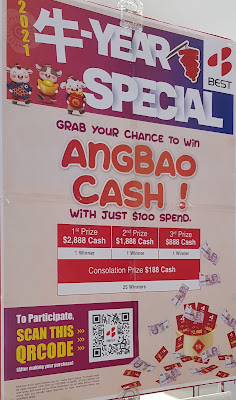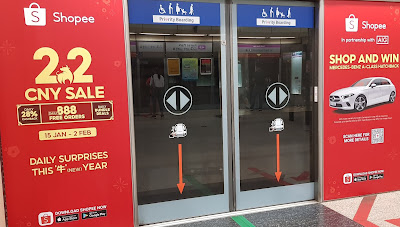The ox takes over from the rat as the second animal* in a 12-year cycle in the Chinese zodiac, in 2021, and is welcomed as a change from a challenging year. Chinese New Year begins February 12 this year, and auspicious language will be the norm from the first till the 15th day of the lunar new year.
 |
| A wish for lots of business opportunities. |
Fortune-related greetings in business settings include:
- 和气生财 (he qi sheng cai), 'wealth arising from harmony',
- 步步高升 (bu bu gao sheng), or 'rising higher with each step taken',
- 财源广进 (cai yuan guang jin), or 'may riches enter in huge volumes', or 财源滚滚 (cai yuan gun gun), 'may riches gush in',
- 东成西就 (dong cheng xi jiu), or 'achievements everywhere, literally from east to west',
- 工作顺利 (gong zuo shun li), 'may your work go smoothly',
- 鸿运当头 (hong yun dang tou), 'may fortune find you',
- 货如轮转 (huo ru lun zhuan), 'may your products sell like hotcakes, as quickly as wheels turn',
- 马到成功 (ma dao cheng gong), 'instant success',
- 年年有余 (nian nian you yu), 'surpluses every year',
- 平步青云 (ping bu qing yun), 'an easy path to a meteoric rise',
- 升官发财 (sheng guan fa cai) 'get a promotion and a raise',
- 生意兴隆 (sheng yi xing long), or 'may the business thrive greatly',
- 事业有成 (shi ye you cheng) 'success in business' , 事业发达 (shi ye fa da) 'a successful business',
- 新年进步 (xin nian jin bu), which means 'making progress in the new year',
- 新年进步 (xin nian jin bu), which means 'making progress in the new year',
 |
| Singapore's Chinatown in the year of the rat, with a focal lantern display on the left, and Yue Hwa Emporium on the right. |
Greetings can also involve the animal for the year, such as filling in the blank accordingly for ___年大吉 (___ nian da ji), 'great fortune in the year of the ___', and ___年行大運/___年行大运, 'great luck in the year of the ___' depending on which animal whose year it is. It is the year of ox (牛, niu) this year, the tiger (虎, hu) in 2022 and the rabbit (兔, tu) after that.
Brands often pun on positive classical Chinese sayings in their festive marketing**. 2019 was unusual for featuring very few puns on pigs in Singapore, and 2020 was the same as the rat is often depicted negatively in classical Chinese phrases.
 |
| A festive OSIM atrium setup at Jurong Point, Singapore. Note the festive greetings around the pedestal. |
 |
| Sign at Best Denki, Jurong Point. A 牛 year special - a double pun on "new year" and the ox year. |
 |
| Shopee's advertisement of its February 2 sale promises daily surprises this '牛' (new) year. |
 |
| Collin's, the restaurant, decided to go for a pinyin flavour: a "niu" year. |
 |
| Bossini at Jurong Point went in both for 牛转乾坤 and references to the 牛 year. |
 |
| EB has included a wish to prosper to satisfaction, or 发够够(fa gou gou). In Hokkien, the phrase is pronounced 'huat gao gao', with 'cow' substituted for 'gao'. |
2021 has continued with this trend. Just one phrase, 扭转乾坤 (niu zhuan qian kun) is used, with the word 扭 replaced with the homonym 牛. The phrase means "to bring about significant change", something everyone is looking forward to. This year, brands have also gone in for bilingual puns with 牛 or "niu" replacing "new" in "Happy new year", and wishes for an "ox-picious" year.
No traditional Chinese New Year banquet in Malaysia and Singapore is complete without a lohei (撈起) ceremony before the meal proper. Loheis are available weeks before Chinese New Year, up to the 15th day.
A platter of yusheng (鱼生), a raw fish*** salad, is first brought to the table after which toppings are ceremoniously added individually, accompanied by auspicious wishes. Specific ingredients are associated with specific phrases. The sweet sauce is typically added while saying 甜甜蜜蜜 (tiantian mimi, a wish that life will be sweet) and the fish or seafood component arranged on the salad while saying 年年有余 because 余 (yu, surplus), sounds like 鱼 (yu, fish).
Once complete, diners toss (lo) the salad with chopsticks while calling out their wishes for the coming year. The higher the salad is raised (hei), the better the luck for the coming year. The ceremony is to be a subdued affair in 2021, with restaurant diners in Singapore to be masked and no auspicious greetings to be said.
If you can't remember too many greetings, don't worry - a simple 'happy new year' is fine. The whole idea is to start off the year right, and it's traditional to hope for fortune, prosperity and success. Just stay away from anything negative. 万事如意 (wan shi ru yi), 'may all things be as you wish'!
*The sequence, according to legend, came down to which 12 animals arrived first in a race to be included in the zodiac. The animals crossed the finishing line in the sequence of rat, ox or cow, tiger, rabbit, dragon, snake, horse, goat or sheep, monkey, rooster, dog and pig. What everyone also seems to agree on is that the rat took advantage of the ox. It was actually in second place, but jumped off the ox's back to get to the finish line first.
**For 2018, the year of the dog, the word 旺 (wang), which has connotations of abundance and prosperity, was common in festive decor as it sounds similar to the sound a dog makes, 汪 (wang). In 2017, the year of the chicken (鸡, ji), drinks manufacturer Pokka wished everyone 吉祥如意 (ji xiang ru yi) - all the happiness and prosperity that you hope for, but replacing 吉 with 鸡, and 祥 with 翔 (xiang), which means to 'soar' in keeping with the avian theme.
2015 was the year of the goat (or sheep), and there are a few festive greetings that take advantage of how the word for goat, 羊 (yang), is a homonym found in various Chinese idioms. 阳光灿烂 (yang guang can lan) is a wish for bright sunlight or a bright future; 喜气洋洋, converted to 喜气羊羊 (xi qi yang yang) for the year, refers to happiness everywhere; while 羊羊得意, really 洋洋得意 (yang yang de yi), is a wish that the recipient will get whatever he or she wants, in the best way possible.
马到成功 is especially apt in the year of the horse in 2014, as the character for horse, 马, begins the greeting, but it can be used at any other time as well.
 |
| A lohei platter. Each ingredient has an auspicious meaning, including the raw salmon (abundance) in the middle, and the crackers (money). |
No traditional Chinese New Year banquet in Malaysia and Singapore is complete without a lohei (撈起) ceremony before the meal proper. Loheis are available weeks before Chinese New Year, up to the 15th day.
A platter of yusheng (鱼生), a raw fish*** salad, is first brought to the table after which toppings are ceremoniously added individually, accompanied by auspicious wishes. Specific ingredients are associated with specific phrases. The sweet sauce is typically added while saying 甜甜蜜蜜 (tiantian mimi, a wish that life will be sweet) and the fish or seafood component arranged on the salad while saying 年年有余 because 余 (yu, surplus), sounds like 鱼 (yu, fish).
Once complete, diners toss (lo) the salad with chopsticks while calling out their wishes for the coming year. The higher the salad is raised (hei), the better the luck for the coming year. The ceremony is to be a subdued affair in 2021, with restaurant diners in Singapore to be masked and no auspicious greetings to be said.
If you can't remember too many greetings, don't worry - a simple 'happy new year' is fine. The whole idea is to start off the year right, and it's traditional to hope for fortune, prosperity and success. Just stay away from anything negative. 万事如意 (wan shi ru yi), 'may all things be as you wish'!
*The sequence, according to legend, came down to which 12 animals arrived first in a race to be included in the zodiac. The animals crossed the finishing line in the sequence of rat, ox or cow, tiger, rabbit, dragon, snake, horse, goat or sheep, monkey, rooster, dog and pig. What everyone also seems to agree on is that the rat took advantage of the ox. It was actually in second place, but jumped off the ox's back to get to the finish line first.
**For 2018, the year of the dog, the word 旺 (wang), which has connotations of abundance and prosperity, was common in festive decor as it sounds similar to the sound a dog makes, 汪 (wang). In 2017, the year of the chicken (鸡, ji), drinks manufacturer Pokka wished everyone 吉祥如意 (ji xiang ru yi) - all the happiness and prosperity that you hope for, but replacing 吉 with 鸡, and 祥 with 翔 (xiang), which means to 'soar' in keeping with the avian theme.
2015 was the year of the goat (or sheep), and there are a few festive greetings that take advantage of how the word for goat, 羊 (yang), is a homonym found in various Chinese idioms. 阳光灿烂 (yang guang can lan) is a wish for bright sunlight or a bright future; 喜气洋洋, converted to 喜气羊羊 (xi qi yang yang) for the year, refers to happiness everywhere; while 羊羊得意, really 洋洋得意 (yang yang de yi), is a wish that the recipient will get whatever he or she wants, in the best way possible.
马到成功 is especially apt in the year of the horse in 2014, as the character for horse, 马, begins the greeting, but it can be used at any other time as well.
***Various
chefs have experimented with different takes on the salad. The raw fish
component has been replaced by Wagyu beef slices, smoked salmon, sliced abalone or lobster
for example, while the salad may be replaced by fruit. Fancier toppings
such as gold flakes or caviar have also appeared in recent years.


